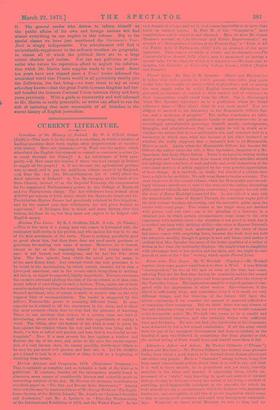Parted Lives. By Mrs. J. K. Spender. (Hurst and Blackett.)—
If ladies who write novels in which persons with titles play parts would take the trouble to study a table of precedence, and so master the very simple rules by which English honorary distinctions are governed, an increase of comfort to their readers and of coherence in their compositions would result from the effort. One is discouraged when Mrs. Spender introduces us to a gentleman whom his friend addresses thus :—" Man alive ! what do you want more ? You are obliged to succeed to the baronetcy as the Honourable Gilbert Sut- ton, and a modicum of property." The author vouchsafes no infor- mation respecting this gentleman's family or antecedents—he is an exceedingly uncomfortable personage himself, moody, contemptuous, dyspeptic, and atheistical—so that one might be left in doubt as to whether she means that he is a nobleman's son, and somehow heir to a baronetcy, in which case, what has become of his elder brother ? or whether she really supposes that a baronet's heir is an Honourable Mister as such. Again, when the Honourable Gilbert has become Sir Gilbert, the author turns his wife, a Miss Openshaw, daughter of a Mr. Openshaw, into Lady Flora Sutton. There is no harm in writing stories about peers and baronets; there is no reason why lady-novelists should not indulge their own love of rank and title, and avail themselves of the convenient motives of action supplied by the very general appreciation of those things. It is snobbish, no doubt, but novels of a certain class have a right to be snobbish. We only want them to be also accurate. The story improves in the second volume, when the Honourable and exceed- ingly tiresome unbeliever is sent to the rear, and the author, discarding philosophical tall-talk and religious controversy, occupies herself with the story of Honor Eneleigh's married life. As the wife of a man with the unpardonable name of Rayner Tarrant, the somewhat vague girl of the first volume becomes interesting, and the narrative gains upon the reader with every page. Two scenes in the tragic story are marked with power, real and rare ; one is the pleading of a barrister in a criminal case, in which certain circumstances come home to his own conscience with terrible force—the situation is not novel in kind, but it is worked out here with striking ability—the other is Rayner Tarrant's death. The perfectly real, unadorned pathos of the story of those last hours comes with surprising force, because the book does not hold the attention steadily, though it grasps it now and then,—and makes it evident that Mrs. Spender has more of the better qualities of a writer of fiction in her than she habitually displays. She might trust to simplicity with advantage both to her stories and her style, and she ought to cure herself at once of the " fine " writing which spoils Parted Lives.


































 Previous page
Previous page